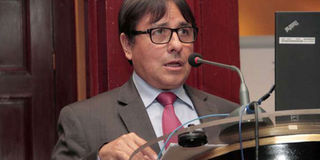Diversify economy to grow, IMF advises Kenya

International Monetary Fund (IMF) Kenya representative Armando Morales during the launch of the 2015 Regional Economic Outlook report on Sub-Saharan Africa at The Norfolk Hotel on May 18, 2015. Mr Morales cited the need to enhance productivity in the country’s agricultural sector, saying it holds great fortunes for development. PHOTO | DIANA NGILA | NATION MEDIA GROUP
What you need to know:
- For years, the Kenyan economy has largely been backed by agriculture, with the country being a key exporter of tea, horticultural produce, coffee and pyrethrum.
- In September last year, however, the Industrialisation ministry unveiled a grand development blueprint, which seeks to reduce Kenya’s reliance on imports for consumer goods.
The International Monetary Fund has urged Kenya to diversify its economy to take advantage of new promising sectors with huge opportunities for growth in the face of gloomy projections for world growth.
IMF Kenya representative Armando Morales cited the need to enhance productivity in the country’s agricultural sector, saying it holds great fortunes for development.
“Kenya is less affected by the slump in (global) commodity prices compared to other African countries. But the fact that export growth has been minimal for several years now makes the need for diversification also pressing,” Mr Morales told the Nation in an interview.
He added: “Just by improving agricultural productivity, new business opportunities will arise in different sectors, from manufacturing to services.
“Eventually this should translate into deeper insertion of Kenyan products in global markets, especially when the ongoing investment in infrastructure upgrades start to pay off.”
For years, the Kenyan economy has largely been backed by agriculture, with the country being a key exporter of tea, horticultural produce, coffee and pyrethrum.
In September last year, however, the Industrialisation ministry unveiled a grand development blueprint, which seeks to reduce Kenya’s reliance on imports for consumer goods.
Even then, manufacturing contribution to the GDP has averaged 11 per cent in the past 10 years despite efforts to jolt the sector.
According to latest government data, the country’s economy expanded by 5.8 per cent during the third quarter of 2015, compared to 5.2 per cent recorded during a similar period in 2014.





